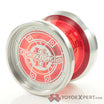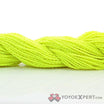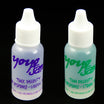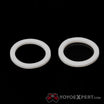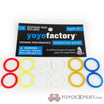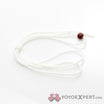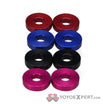Out of curiosity what’s your opinion on leaded solder? I’ve heard it’s not dangerous unless you directly inhale the fumes with your face very close to the joint.
Why would you need yoyo material to be ductile? You’re just taking bar stock and cutting it. It shouldn’t be deformed very much if at all in use either
There go my weekend plans!
Iron is typically considered an impurity in aluminum, and often can cause it to become overly brittle, which may be perfectly fine for a yoyo…until you smack it on the ground.
Correct, the biggest issue with leaded solder is the fumes. It’s generally safe to handle, as long as you don’t have any cuts on your hands.
Impurities improve strength and hurt ductility. Whole point of stuff like work hardening is adding impurities like dislocations so it’s harder to deform the material.
If you have a crack, any attempts to deform it either bend the material or propagate the crack. That’s simply the tradeoff you make. Either it bends or it cracks, and I think you’d rather your yoyo be more resistant to plastic deformation than improve its already good resistance to cracking.
Well I guess this explains why I felt like my 7075 yo-yos were denser then my 7068 yo-yos. I guess I wasn’t trippin ![]()
![]()
![]()
We have investigated ourselves and found no wrongdoing /s
How much impure and porous material is hiding beneath the ano? We may never know…
It is good to be an educated consumer
edit; I have made posts here previously about material traceability and how regulations around material certifications exist to protect consumers. I will not link them directly but its on here.
I believe it is good to hold these manufacturers responsible, and while we may be lucky our application isnt so “safety” critical, it still highlights why we should be conscious of who we support and how delicate the reputation is that comes with that.
This reminds me of a story from earlier this year about some potentially fake titanium entering supply chains.
Tyler from UNPRLD is a great dude. Really proper how he handled this.
First post here, I’m not much of a social media person so please excuse the lack of presence online. I wanted to clear up some things here.
Sample 24-5346-2 was a yoyo that was machined for a different brand by a different machine shop compared to sample 24-5346-1 and 24-5346-3 in order to have a control. The original claim by the machine shop for the Nation and Method was that none of the yoyos in the yoyo market altogether were making yoyos in 7068, that the material did not exist in the yoyo world. I believed that if this were the case, all 3 samples, although not as advertised, should at least be the same grade of material. As testing concluded, you can see there was a significant deviation between the metal that we used for Method and Nation, compared to what this third party machine shop had made. I do not want to disclose the factory to the public because I do not want the public to harass this machine shop or their representatives. I have disclosed to a few yoyo brands strictly in order for them to protect themselves as well.
I want to bring up that sample 24-5346-2 did eventually hit the market (years ago) as a 7068 yoyo and as far as I know had no issues. The high lead content in the yoyo could be considered a danger, but I do not know enough about that situation, nor is it my yoyo. The brand has already been made aware of this, but I believe inaction from them is completely acceptable, as they were unaware of this situation when it released, and this yoyo was made more than half a decade ago.
The reason why Yoyofriends was able to produce testing results so quickly was because I had tipped them off about it back in August at the World Yoyo Contest. I thank Philip and the rest of FPM for taking swift action and deciding to test for themselves as well. They are a reputable brand and any ill assumptions of their actions should not be taken as such. They have gone above and beyond to prove that they are legit.
Your guess is as good as mine as to whether or not the factory that made the Method and Nation maliciously duped us, or if it were an innocent mistake, but ultimately there is no way for anyone but himself to know. I would like to publicly say that I have no ill intentions towards this factory, and with this resolution I consider this problem resolved between us and the machine shop. If you somehow deduce what machine shop this is, I again ask you to not harass them.
Please don’t be afraid to reach out to me via email at unparalleledyoyos@gmail.com for any questions. I’ll do my best to check here periodically, but I am relatively busy recently. However, your questions and concerns are important to me.
Sounds like this could have been the fault of the Government. Maybe I read that wrong
You have a couple of fundamental metallurgical principles wrong. Impurities CAN improve strength and hurt ductility, though they can also do the exact opposite. By definition, an impurity is not desired, so if you’re adding something to a mixture to get a certain desired outcome, it’s not an impurity. You add aggregate like sand and rock to cement to create concrete which makes it more durable, but that doesn’t mean sand and rock are impurities in concrete - though they would be if you were making steel. And there are many steels where impurities hurt the strength and improve ductility.
Dislocations aren’t impurities. They’re flaws in the crystal structure that increase strength through strain strengthening (sometimes slightly incorrectly referred to as work hardening). You can have a strand of 100% pure copper with many dislocations in it.
There’s two types of ‘bending’ (deformation) - elastic and plastic. In general, elastic bending is good, and plastic bending is bad. Plastic deformation is when the material doesn’t spring back to it’s original shape and will eventually fail. Most engineering designs focus on the elastic region.
All I was saying that if you make an aluminum yoyo with 1.3% iron, it’ll probably shatter when you smack it on the ground.
I see. Been a while since i took a material sciences course so i got some thing confused with crystalline defects and the plastic regime. Either way the yoyo is being permanently damaged past the yield strength and that much iron doesn’t really help does it.
Coincidentally, I was wondering whether the same shop might have also supplied and machined not-really-7075 yoyos as well. All we know is that 7068 yoyos were tested.
iirc somewhere between 2020 to 2022 a number of machine shops started to “encounter issues with anodizing” their new batches of 7075, and thats also when they started to promote 7068 as a substitute. this 7068 from that time was said to anodize well and have strength as least on par with 75 but also a somewhat lower density
As a person who works in quality, it’s concerning that there weren’t already procedures in place to test raw materials upon receipt. Or at the very least requiring letters of guarantee and/or certificates of analysis from the supplier.
Every plant I’ve worked in or been to or even heard of has these policies in place to avoid fraud, contamination, etc.
Unfortunately this testing costs money and that cost I’m sure will be passed along to us, the consumers, but it would have ended this before it even started.
funny to think this could actually be avoided if they had a yoyo player there. i cant imagine telling apart titanium from aluminum would be difficult for any of us. Now 2 variants of aluminum is a different story though
I’ve seen some people be pretty critical of companies selling more expensive mono metals, this incident vindicated some of those companies in my eyes.
There are many shops doing yo-yos and some are very cheap compared to the trusted and reliable FPM. I imagine some of this is a get what you paid for issue and the shop that had this mix up cut corners to undercut competitors which doesn’t mean they intended for the mix up but may have not done what is needed to verify materials.
Ontop of that many suppliers have used Covid as an excuse as to why things aren’t hitting the standards expected (which is bs at this point but it’s actively happening)
This is also a larger issue in general right now in overseas manufacturing as I’ve seen several reports of sub optimal components manufactured overseas causing major issues in assembly and testing becoming way more common in recent years.
This isn’t to bash any manufacturers specifically or any nations but to note the supply chain has issues and shortcuts are being made to accommodate
